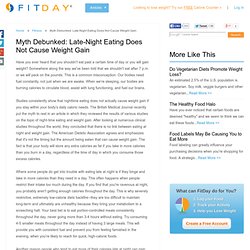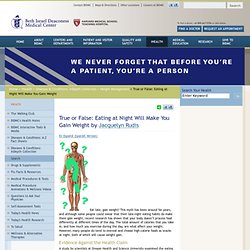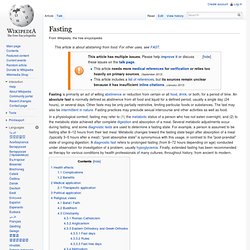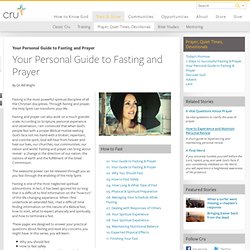

How to Stop Eating at Night: 8 Steps. Edit Article Edited by Harri, Flickety, Zareen, BR and 15 others Eating at night is a bad habit to get into because it doesn't leave enough time before going to bed to digest your food well.

Nighttime eating can lead to snacking excessively on junk food and it can also be at the root of poor sleep. If you're looking for ways to stop eating at night, consider the following steps in your efforts. Ad. Sleeping Positions For Better Digestion. The Mayo Clinic advises that you should refrain from eating at least two hours before you head to bed.

If you do eat during this time period, it should be light fare only. Why You Should Eat at Night. Myth Debunked: Late-Night Eating Does Not Cause Weight Gain / Fitness. Have you ever heard that you shouldn't eat past a certain time of day or you will gain weight?

Somewhere along the way we've been told that we shouldn't eat after 7 p.m. or we will pack on the pounds. This is a common misconception. Our bodies need fuel constantly, not just when we are awake. When we're sleeping, our bodies are burning calories to circulate blood, assist with lung functioning, and fuel our brains. Diet Truth or Myth: Eating at Night Causes Weight Gain. Is late eating more likely to pack on the pounds?

Why do I need to register or sign in for WebMD to save? We will provide you with a dropdown of all your saved articles when you are registered and signed in. Eating at night has long been associated with weight gain. Years ago, nutrition pioneer Adele Davis gave her well-known advice to “eat breakfast like a king, lunch like a prince and dinner like a pauper.” Does my body digest food while I sleep. Digestion at night time. Weight Management. Eat late, gain weight?

This myth has been around for years, and although some people could swear that their late-night eating habits do make them gain weight, recent research has shown that your body doesn’t process food differently at different times of the day. The total amount of calories that you take in, and how much you exercise during the day, are what affect your weight. However, many people do tend to overeat and choose high-calorie foods as snacks at night, both of which will cause weight gain. Evidence Against the Health Claim A study by scientists at Oregon Health and Science University examined the eating habits and weight-gain patterns of rhesus monkeys, which they considered to be a useful model for studying human obesity .
Under normal circumstances weight fluctuates over weeks and months—not hours—due to long-term patterns of eating and exercise. Evidence for the Health Claim Various techniques have been suggested to limit total daily calorie intake. Conclusion. Eating at night = weight gain: Myth or fact? Dear Alice, My friends and I disagree — can you settle the dispute?

I feel a calorie is a calorie no matter what time of day that you eat it. They say that if you eat all of your calories early in the day, that it is less fattening, because you will be moving around burning off those calories. I say that if you eat 1800 calories a day, it doesn't matter if you eat them in 5 meals or 10 meals, it is still 1800 calories. I believe that the idea of not eating anything after 7 helps you to lose weight because you cut out the high calorie, high fat foods that are often eaten late in the evening. Dear Reader, Explain which is faster digestion during sleep and physical exercise. Fasting. Fasting is primarily an act of willing abstinence or reduction from certain or all food, drink, or both, for a period of time.

An absolute fast is normally defined as abstinence from all food and liquid for a defined period, usually a single day (24 hours), or several days. Other fasts may be only partially restrictive, limiting particular foods or substances. The fast may also be intermittent in nature. Fasting practices may preclude sexual intercourse and other activities as well as food. In a physiological context, fasting may refer to (1) the metabolic status of a person who has not eaten overnight, and (2) to the metabolic state achieved after complete digestion and absorption of a meal.
Health effects[edit] Complications[edit] Health complications associated with fast-induced starvation include electrolyte imbalances, thinning hair, lanugo, potentially fatal cardiac arrhythmias[1] and renal failure. Benefits[edit] According to Dr. Medical application[edit] Political application[edit] Are Fasting Diets Safe and Effective? Why do I need to register or sign in for WebMD to save?

We will provide you with a dropdown of all your saved articles when you are registered and signed in. Some people fast as a way to lose weight. Others fast to try to detox their bodies, or for religious reasons. Your Personal Guide to Fasting and Prayer. Your Personal Guide to Fasting and Prayer Fasting is the most powerful spiritual discipline of all the Christian disciplines.

Through fasting and prayer, the Holy Spirit can transform your life. Fasting and prayer can also work on a much grander scale. According to Scripture, personal experience and observation, I am convinced that when God's people fast with a proper Biblical motive-seeking God's face not His hand-with a broken, repentant, and contrite spirit, God will hear from heaven and heal our lives, our churches, our communities, our nation and world. Fasting and prayer can bring about revival - a change in the direction of our nation, the nations of earth and the fulfillment of the Great Commission. The awesome power can be released through you as you fast through the enabling of the Holy Spirit. Fasting is one of the most neglected spiritual admonitions. [Aspects of sleep effects on the d... [Arq Gastroenterol. 2002 Jan-Mar. What happens to digestion/metabolism at night, when you sleep? - Diet & Nutrition Message Board.
What Happens When you Sleep? Sleep is important.

So says the slumbering eyes searching for the coffee pot and that artificial stimulation that will make us forget about the sleep we didn't have. In order for us to get the most out of that time we spend sleeping we should understand what is going on and why it is important. According to the Sleep Architecture model sleep occurs in cycles. One sleep cycle is made up of five stages and lasts about 90 minutes. A typical night's sleep is comprised of five complete cycles. What happens to your body while you're asleep. By ANGELA EPSTEIN, Daily Mail We spend about one-third of our lives asleep. But far from being wasted time, from the moment we slide into unconsciousness, a whole raft of functions takes place to make sure that we get optimal benefit from our nightly rest. The Characteristics of Sleep. What Is Sleep? Every night, nearly every person undergoes a remarkable change: we leave waking consciousness and for hours traverse a landscape of dreams and deep sleep.
When we wake, we typically remember little or nothing about the hours that have just passed.